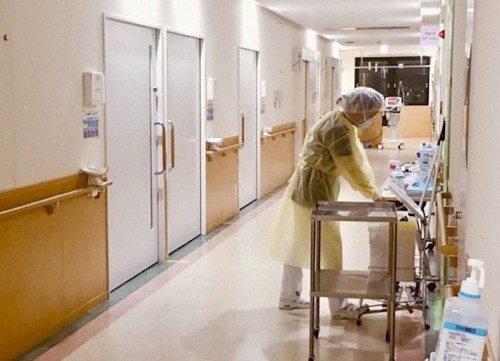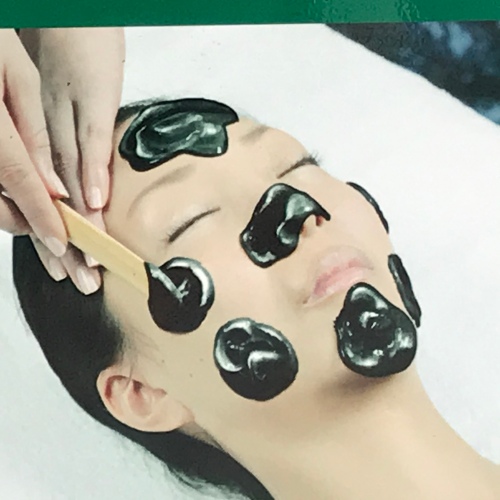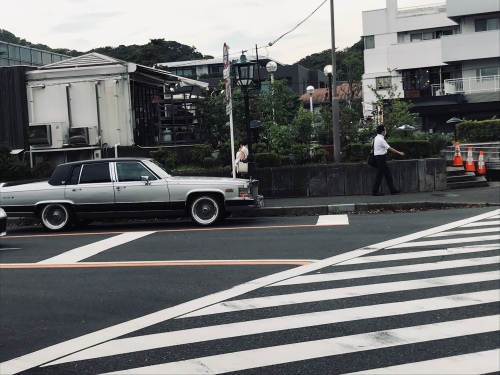



Sitting on the balcony yesterday evening, I asked Duncan why he was living in Japan. It is not usually a question I would ask outright, but recently, he seems to have rather hardened in his irritation – you might even called it a kind of calcified, internalized fury – about the general reaction to the current pandemic here (which this country only slowly seems to be opening its eyes to; it has been beyond exasperating). He will roll his eyes, or look straight ahead of him in a way I am not sure that I have ever seen before, when asked about the general attitudes and lack of action taking place in these perturbing, maddening; terrifying times.
He thought about my question quietly for a moment and then calmly gave a list of reasons why he loves living in this country: the first one being, quite sensibly, that ‘our life is here’. That is true. It was never any part of any general plan to move to this part of the world, but it happened, and it worked. The refinement, the finesse, he said. The politeness. The general respect. The unbelievable levels of safety (something you can truly never, ever take for granted: until you have experienced this, you cannot imagine what it feels like). The sheer excitement of the cities. The incredible food. The gentleness. The surroundings here in Kamakura. Nature, the ancient culture. The open-mindedness (you could also call it permissiveness, or tolerance – how else do you think we can walk around the way we do sometimes at night in Tokyo without anything ever happening? The responses are almost unanimously joyous and gleeful: there is no Judaeo-Christian moral judgment). These were just his first, throw-away ideas of why we do like living here; I could add many more (the classical culture; the weird, manic cyber- subcultures, the sheer, visual, aesthetic pleasure we derive from floating through Japan enough to sustain us for many years still to come). ‘But I really hate the work culture’ he said, looking at me firmly. And this, despite the fact that his own school is comparatively very mindful of the wellbeing of its staff and students and nurtures a generally positive environment.
He is not just thinking of himself though. He is thinking of all the brainwashed fools – sorry, loyal company employees, that have been continuously going into work on buses and trains in the last few critical weeks despite the government’s ‘request’ that social contact be reduced by 80% in order to save the country from a catastrophe ; a very ineffectual plea when people are given an implicit choice whether to work under such an ‘edict’ in a endemically workaholic culture such as this one (the government apparently does not have the legal right to enforce the kind of lockdowns being experienced in other countries, since the Allies post World War II set up a deliberately very liberal constitution to avoid repeating any nationalistic military dictatorships such as the Emperor Hirohito), all leading to this bizarre, truly ambiguous situation in which there is a State Of Emergency while there isn’t a ‘state of emergency’; pachinko parlours – vile slot machine and pinball arcades, hotbeds of infection, the domains of the chronically addicted, drop outs who queue up outside them every day in huge droves right now despite the risk of the coronavirus to play deafening automated machines sat right next to each other in hideously smoky environments (the smell when you walk on by one of these places!) their quickminded fingers constantly smearing the screens, always inhaling the same, foetid air……………largely remain open (all the government will do is print the names of such rule-bucking establishments in order to ‘shame’ them, often to no avail – the pachinko honchos, probably in cahoots with the yakuza, couldn’t care less, and the government needs the huge revenue they get from them in the first place); restaurants are still open and being patronised (because how many salarymen know how to cook here?) ; couples and families are still happily out and about – albeit in waning numbers, it was reported today, as people finally come to realise the severity of the situation. Just. Yet it always seems that many – most, even – are pretending that nothing is happening, or at least they are looking that way on the surface. ‘We are Japanese, so we are stoic. We have great hygiene. We are above all of this and will not be affected by it in the same way as other countries’ was Duncan’s sarcastic appraisal yesterday evening of the situation. I would agree: I would even say there is a fatalistic ‘if it happens, it happens’ samurai-ish suicide dream packed somewhere in there; a ‘shoganai’ – there’s nothing I can do about it resignation, or else a deeper unwillingness to sacrifice the daily sacrifices in the name of an unseen virus when the pressures to conform in the workplace are so strong that they can override the very real fears that people must have somewhere, locked and bolted deep inside.
But do they? Really? It’s hard to tell. Cycling back from the local shops to buy some sundries for mealmaking for the next couple of days yesterday afternoon, I was again baffled, and immediately angered, by the complete lack of social distancing occurring; customers crowding round outside the meat shop to buy home made croquettes now it is Golden Week and families are off together ( I wanted some too, but was put off straight away and desisted); most were wearing masks, but there was still no real sense of urgency or needing to stand away from each other; locals milling; no hand sanitisers used by the shopkeepers (I did, quite boldly, make the suggestion in one place; the lady at the organic vegetable grocer’s, whose produce we categorically rely on – really delicious, fresh produce – made a wry unnn when I said this to her, looking at me slightly dryly from behind her paper mask as though I were questioning the levels of her personal hygiene); I know the lady in the bread shop is rather out of it these days; dotty, forgetful, still wearing her winged, liquid eyeliner and teased up thinning beehive that went out of fashion in the mid-sixties, but I had expressly said I didn’t want a plastic bag in an bid to reduce physical contact; I don’t want my purchases to be manhandled, preferably – in a dreamworld, not even touched; having assembled the things I wanted, I was about to deposit those items in my rucksack but the old dear did have to thoroughly fondle the chocolate with her fingers trying to locate the price tag (she never has any idea how much anything is); the same at every other shop, where we could be picking up the virus from everything we eat. We don’t know what to do: The alternative: cycle forty minutes into town, a busy commuter hub, to bigger supermarkets, with crowds of people in even closer proximity, and a much higher chance of infection – at least up here at the top of the hill in Imaizumidai it is marginally better, or start to order groceries online (have you been doing this?). We have no choice – where else are we going to get food? We have to eat. Even the hapless pizza delivery boy the other night kept dropping his change and re-handling everything and passing it on – there were no attempts to stand away as I opened the door: as I handed over the yen to him from my wallet we practically kissed.

Riding home, yesterday, I passed by the well-renowned tempura and soba restaurant which is thirty seconds from our house – one of the most delicious meals you could ever have is there for our delightment virtually every weekend; the place is justifiably famous, and people come from miles around to have the homemade buckwheat noodles and incredible mixed vegetable kakeage. But now? Although part of me feels a bit guilty that we haven’t been going recently – of course I want to support local businesses – they rely on customers to keep going – a stronger part of me selfishly just simply does not want to go into a restaurant. Any restaurant. I feel turned off. Sickened at the thought of it (don’t you?) In almost all countries, they are all closed in any case, so you can’t go out and eat even if you want to. But not here. They close at 8pm rather than 11pm, as though the virus only comes after you after dark, like a virological vampire. Yesterday, in the street I saw a group of seven or eight middle aged men emerge from the premises of the soba-ya and they were all maskless, the restauranteur included; jolly, close together, faces up close, clapping each other the back, having a whale of a Golden Week party gathering, physically close and touching – and I despaired. What is it going to take to make these people realize?
(THE CHRONIC HOSPITAL SCENARIOS! ! )
https://www.japantimes.co.jp/news/2020/04/18/national/coronavirus-japan-hospitals/#.XqY07DJh08Y
To look at the situation simply, and rationally, is to feel your chest contracting in stress. The fact is – corroborated by the prime minister and every reliable news agency here – that the rate of infection in Tokyo has increased ten fold over the last four weeks, and the country is running out of hospital beds (per capita it has half the number of ICU units as Italy does). We all know that the reason that Germany has a far lower death rate than most other countries is because of the number of intensive care facilities and ventilators it has amassed; Japan has far fewer. There have been numerous reports of very sick patients being turned away from hospitals, unable to breathe; ambulances circling around for hours trying to find a willing emergency department to take them in; like other countries, the doctors and nurses are crying out for surgical masks, gloves, protective equipment – and this is one thing I will honestly never understand : how the richest countries in the world: the US, the UK, Japan, Italy, aren’t able to provide the basic necessities for their heroic medical staff in these terrible times; why they can’t just jump up production – it is literally beyond my intelligence to grasp why this could be so difficult.
Or to let people work from home. Do you know that I am, to my knowledge, the only person in my company who has been refusing to go in to the workplace? Everyone else, unless they have family members that have been infected, has been going in; commuting. This means that when I return, I will be even more of a pariah than I already was (no, I was never a pariah as such, just someone always ‘outside’ of everything; removed, except for when I am in the classroom). I will possibly be seen as weak, scared; a coward, when my instinct tells me that I am the opposite in my resistance: I was brave to stand up for my right to try to not get infected, particularly when, if caught by the disease, I probably won’t be able to get into a hospital in any case. By negotiating with the top bodies, I have managed to reach a compromise situation in which I am able to record lessons at home, for the time being at least, with my borrowed video camera, which is what I have been doing these last few weeks; something I have still to acclimatise to but which is getting better as I get used to talking into a camera lens and not physical students in attendance (right now I have two weeks off, as does most of the country, for Golden Week, the time when people traditionally travel to see their parents or leave the country or go on trips and fill up all the famous places, like Kamakura (the other day a couple we sometimes bump into walking their dog said that the famous viewing platform near our house overlooking the beautiful Hansōbo and Kenchōji temples was thronging with about thirty eager Japanese tourists………. …..the government is imploring people not to do this; every morning we have an announcement at 10:00am over the loudspeakers by the Local Resident’s Association stating that the ‘infections of the novel coronavirus are increasing. Please stay at home’, but it is often to no avail. The illogic of it all is mystifying; physically painful to contemplate.)

(recent office workers going about their ‘corona-free’ days in Tokyo, about 45 minutes by train from our local station:: : : : : : is this your own personal idea of ‘social distancing’ ?)
I am praying that more people here will start to comply and take real heed. Reports say that the popular hotspots in Tokyo were significantly less crowded over the weekend compared to January and February – when the virus was already present but nobody gave a damn whatsoever – with the exception of parks (in our local recreational areas and children’s playgrounds, families are also all out together – no social distancing! ; the concept itself somehow just isn’t taking off; it is impossible for people to take it on……………….why?) They are standing as close as they always would. Kids are all running around laughing and squealing and playing in the sand as they always do; yes, the bigger supermarket we cycled down to the other day did, finally, have a system approximating every other country’s idea of reducing physical contact: shop clerks standing glumly behind plastic screens to avoid ‘aerosol droplets’ ; plastic markers on the floor delineating where each person should stand – probably one metre apart, though – not two; the pictures of social distancing in other countries look like photographs from another planet. It is somehow unfeasible here, in a collective society, a group-oriented mindset where to stand two metres apart would be to look ludicrous. ‘Selfish’. But it is a start, anyway. And it might, when I am in an optimistic mood, be enough to prevent what some grim forecasts say could be 400,000 infections soon if things don’t actually get properly turned around (though for some reason I feel that those predictions are exaggerated, not that I am an expert. Or maybe I just can’t handle thinking about such a dreadful situation) There are already talks of a ‘total collapse of the medical system’ – an expression I am not very fond of, and which strikes terror into my heart; like you, I have read about the symptoms, and the intubation needed for severe cases, and the extremities of the body going black if you can’t get sufficient oxygen to them – if you can even get into a hospital here there are so few beds. It does not sound much like much of a summer picnic to me, and makes my determination to try and stay here at home for as long as humanly possible until the situation begins to improve a little bit – and we can be safer – all the more hard-headed.


As usual, everything here is complex. Nothing is ever simple. You never really know what people are thinking. How afraid they are, or are are not. I have experienced this before, after the Great Tohoku Earthquake in 2011, a truly catastrophic triple disaster with a devastating tsunami and nuclear meltdown that left the entire population very shaken, but which was met with great (at times mind-bending) equanimity and mental strength that amazed me; people simply refused to be undone by it; were determined, at core level, to present a brave face to the world. I was both deeply awed, and flummoxed by it at the time; I will never forget it. That said, the current global challenge is surely different. In being ‘stoic and hardworking’ – some of my colleagues have been travelling to and from Tokyo, the viral epicentre, to the workplace, where the teachers have still been having daily meeting crowded together in the staff room (!) with no real distance between them at all – I heard, from my source, they even closed the plastic sliding windows, in the staffroom, as they usually would, to prevent students from hearing confidential matters – except there were no students; this was pure force of habit, and where I differ: oh yes ! You can be sure, oh you can be sure, that, no matter what the consequences were, I would leap up – fuck everybody – and dramatically pull those windows open so fast they would possibly even break or fly off their hinges as I cannot under any circumstances put up with such idiocy, no matter the reactions of my more self-contained, ‘dignified’ colleagues who just grin and bear it. It perplexes. Oh, how it perplexes.
I am aware, as I always am here, that there are layers of compulsion, reasons for certain actions and behaviours that I am sometimes not consciously aware of. Like a societal onion, the layers are removed; a deeper layer revealed. I learn. I take in. I understand. It makes sense, in the context. While certain failures are undeniable – I was already spewing acid on here a long while ago about the useless reaction to the Diamond Princess quarantine in Yokohama at the end of January and the beginning of February (WHY. DID IT TAKE THEM. SO LONG. TO FUCKING DO SOMETHING? Why did they just release the infected passengers into the public transportation system? It was beyond, beyond comprehension. STOP! I HAD PROMISED MYSELF I WOULDN’T GET TOO RILED UP HERE; I was trying to keep it calm and measured! !!!! ); but why are there all these half-assed, half-baked measures that go against common sense and global objective reason in combatting the spread of this fucking virus?)
AAAAAAGGGGHHHHHHHHHHHH – excuse me while I scream and blow my head off. But no, as D says, this is Japan, and you just have to accept that you can’t do anything about it. The Japanese have their ways. We just have to keep going with it. You live here. You reap the benefits, the advantages: you have to go with the flow. There are things you perhaps have not considered: for example, I read in an article in the Japan Times that the correlation between unemployment and suicide is so great here – deaths have already been increasing a lot on the railways of Tokyo, people leaping to their deaths on the tracks despite the lower numbers of passengers – that the government has to seriously weigh up the risk of suicide and social breakdown against the risk of death from the virus. Though complete loss of income is obviously a traumatic event for any human being, a study has shown that the prevalence of mental illness and self-harm when connected to the loss of work and the presumed loss of dignity that ‘failure’ entails in Japan is in direct proportion to the seriousness of the economic malaise; for many people here, they are their work, so when small or middle-income businesses close down and those that rely on this money to stay afloat go under, so, often, do their owners. It is a spiritual death. According to this study, there is no comparable tendency in Spain and Italy. Though the economic distress will be no less appalling, perhaps people in those countries value time with their families or at home more, or at least do not feel that their intrinsic worth, their value as a human being, lies in the job that they do day to day. One thing I know unambiguously; mine most certainly does not.



























